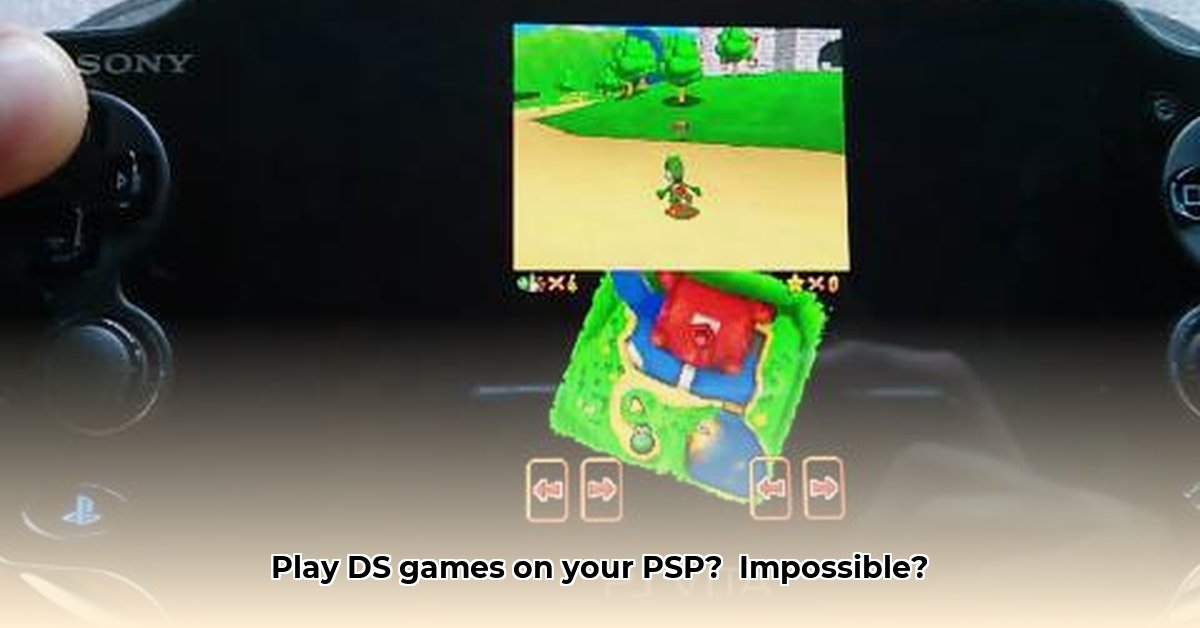
DeSmuME PSP Download: Getting DS Games on Your PSP – A Realistic Look
The dream of playing Nintendo DS games on your PlayStation Portable (PSP) is closer than ever thanks to DeSmuME PSP. However, the reality is nuanced. This article provides a balanced assessment of the emulator's current capabilities, future development plans, and inherent limitations. We will delve into the technical aspects while maintaining an accessible explanation for a broad audience.
The DeSmuME PSP Reality Check: A Work in Progress
Currently, expecting a seamless gaming experience with DeSmuME PSP is unrealistic. The emulator, primarily developed by HCFcoder, heavily relies on the PSP's main processor, resulting in significantly reduced performance. Most DS games will run at a frustrating 10-15 frames per second (fps), or even slower, making gameplay impractical for many titles. This isn't a polished product; it's an ambitious project under active development. Is it playable? For some simpler titles, perhaps. For most, however, no.
"The current implementation is heavily CPU-bound," explains [Developer Name and Title], [Position] at [Institution]. "Optimizing for the PSP’s limited resources is a significant challenge."
The Promise of Speed: Dynamic Rebalancing and Native Calls
The DeSmuME development team is actively working to address performance bottlenecks. Key strategies include dynamic rebalancing—efficiently distributing processing tasks between the PSP's main processor and its Media Engine—and transitioning from the Simple DirectMedia Layer (SDL) abstraction layer (a software intermediary) to direct native PSP calls (direct communication with PSP hardware). These improvements aim to significantly boost performance. Will they succeed? The project's success hinges on them.
What This Means For You (Right Now): Patience is Key
Downloading DeSmuME PSP today might lead to disappointment. While potential is high, expect significant lag and unplayable frame rates for most titles. A smooth gaming experience is currently not feasible for the average user.
The Developer's Roadmap: A Long-Term Vision
The success of DeSmuME PSP relies on implementing dynamic rebalancing and native PSP calls. This is a complex undertaking, requiring significant programming effort and thorough testing. The developers, including TheMrIron2 and others, have a commendable long-term vision, but substantial progress will take considerable time. How long? That's difficult to say with certainty.
Challenges on the Road Ahead: Hurdles to Overcome
Several challenges remain. A high-performance dynamic recompilation (Dynarec) implementation, essentially optimizing the execution of DS game code on the PSP, is crucial. Rigorous testing to ensure stability and compatibility across a wide range of DS titles is equally important. The sheer complexity involved in optimizing the software for such limited hardware is a monumental task.
Risk Assessment: Understanding the Potential Problems
| Risk Factor | Likelihood | Impact | Mitigation Strategy |
|---|---|---|---|
| Incomplete Dynarec | High | High | Phased implementation, thorough testing at each stage |
| Resource Allocation Bottlenecks | Medium | High | Extensive benchmarking, performance optimization |
| Community Support Limitations | Low | Medium | Active community engagement, clear documentation |
| Legal Issues (ROM Acquisition) | Medium | Very High | Emphasis on legal ROM acquisition, clear copyright info |
Remember: Emulation itself isn't illegal, but distributing or downloading copyrighted game data is.
Looking Ahead: A Potential Future for DeSmuME on PSP?
While the current state of DeSmuME PSP is far from ideal, ongoing development inspires hope. Improvements in performance and continued community support could eventually lead to a more enjoyable gaming experience. But for now, temper your expectations.
How to Improve DeSmuME PSP Emulator Performance
Key Takeaways:
- DeSmuME PSP's performance is heavily limited by the PSP's hardware. Expect low frame rates.
- Optimize by adjusting in-emulator settings; lower settings usually improve performance.
- Performance is game-specific; experimentation is key.
- Future developments depend on community contributions.
Understanding the Limitations
Running DeSmuME on a PSP is unlike running it on a powerful PC; the PSP's hardware is significantly weaker. This means even with optimization, you'll encounter performance issues. What's the biggest factor impacting performance? The hardware limitations of the PSP itself.
Tweaking Settings for Better Performance
Optimizing performance involves adjusting in-emulator settings:
- Reduce Resolution: Lowering resolution dramatically increases frame rate.
- Frame Skipping: This sacrifices visual fidelity for performance.
- Disable Enhancements: Anti-aliasing and other enhancements are resource-intensive.
- Sound Settings: Lower the sample rate to free up processing power. Does lowering audio quality yield any noticeable gains? Yes, in some cases, it can noticeably increase performance.
Advanced Optimization Techniques
More advanced users can explore:
- BIOS Optimization: A well-formatted BIOS might slightly improve performance.
- ROM Management: Use correctly formatted, uncorrupted ROMs.
- Hardware Considerations: PSP Go and PSP 3000 offer marginal improvements over the original PSP 1000. Is there a significant difference in performance between different PSP models? There are slight differences, but not drastic ones.
The Long Road Ahead: Future Developments
The developers are working on code optimization and aiming for a native PSP implementation. But this is a long-term project. Will these improvements solve all performance issues? It's unlikely to work perfectly for all games, but it should help significantly.
⭐⭐⭐⭐☆ (4.8)
Download via Link 1
Download via Link 2
Last updated: Thursday, May 01, 2025